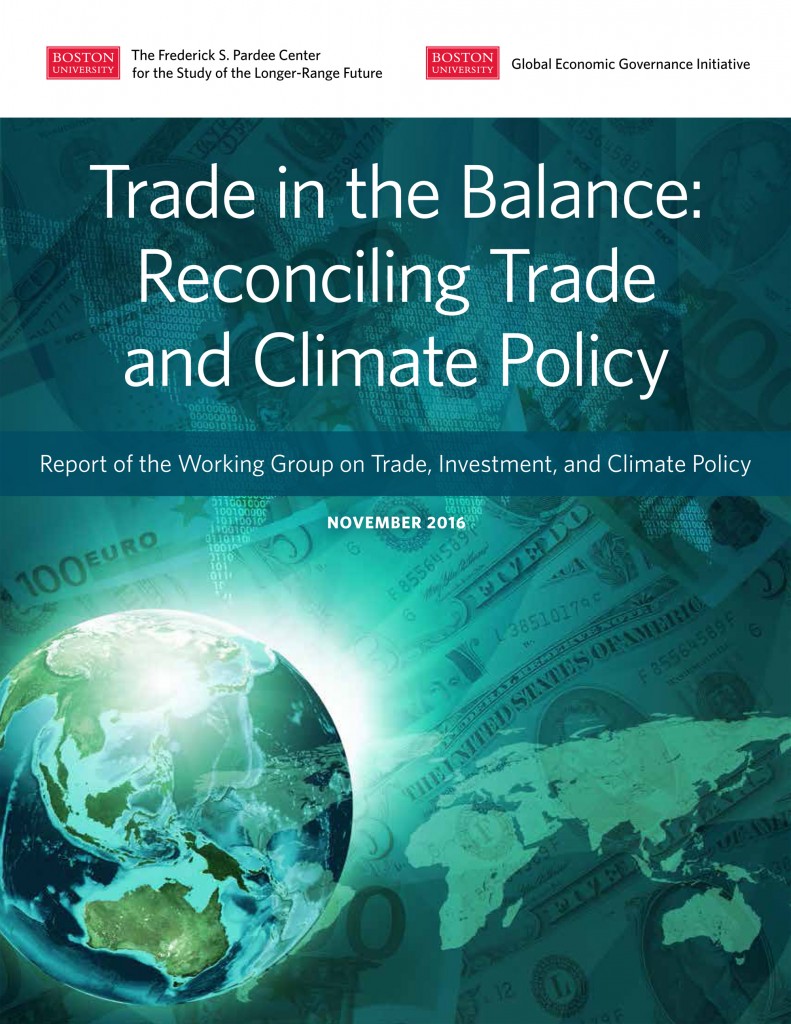Report of the Working Group on Trade, Investment, and Climate Policy
 Trade in the Balance: Reconciling Trade and Climate Policy
Trade in the Balance: Reconciling Trade and Climate Policy
November 2016 (70 pages)
ISBN 978-1-936727-13-1
Download PDF
The United States is currently engaged in a series of trade and investment treaties with nations that represent 80 percent of the world’s GDP and more than 90 percent of the world’s carbon dioxide emissions. At the same time, the United States is engaged with the same set of countries at the United Nations on a multi-lateral basis, and with a number of those nations on a bi-lateral basis, in an attempt to prevent and mitigate further degradation to the earth’s climate. Given that increased trade and investment in low-carbon goods and services will be essential to achieve global climate commitments made at the historic UN climate talks in Paris in December 2015, it is imperative that these parallel policy regimes be consistent with each other.
In April 2016, Boston University’s Global Economic Governance Initiative (GEGI) and Georgetown University Law Center’s Harrison Institute for Public Law convened the Working Group on Trade, Investment, and Climate Policy, a group that included both trade policy experts and climate policy experts from China, North America, and Europe. The group examined the extent to which proposed trade and investment treaties are compatible with global climate change goals. The working group emphasizes that trade and investment treaties can be instruments to advance the global climate and development agenda, but that the prevailing model of trade and investment treaties is largely incompatible with the world’s broader climate goals. The model rules for trade and investment treaties need to be redesigned with an overriding principle to reward climate-friendly modes of economic activity, curb activity that worsens climate change, and provide the proper policy space so that nationstates can adequately address the climate challenge. At the very minimum, the trade model should be adjusted in such a way that treaties do not result in net increases of emissions.
The authors of this report provide important insights about opportunities and barriers for alignment of trade policies and climate goals in trade agreements under negotiation in 2016 such as the Trans-Atlantic Trade and Investment Partnership (TTIP), the Trans Pacific Partnership (TPP), and bilateral investment treaties (BITs) between the U.S. and China, and between the U.S. and India.
The Working Group on Trade, Investment, and Climate Policy is co-chaired by Pardee Center Faculty Research Fellow Kevin P. Gallagher (Professor of Global Development Policy, Pardee School of Global Studies, Boston University and co-director of GEGI) and Matthew C. Porterfield (Harrison Institute for Public Law, Georgetown University). The Pardee Center provided support for the working group and produced this report.
Working Group Members and Authors*:
Frank Ackerman*
Nathalie Bernasconi
James J. Corbett*
Kevin P. Gallagher*
Brooke Skartvedt Güven*
Tao Hu*
Anthony C. Janetos*
Lise Johnson*
Makane Moïse Mbengue
Irene Monasterolo*
Miquel Muñoz Cabré
Matthew C. Porterfield*
Marco Raberto*
Stefanie Schacherer
Judith (Claire) Schachter
Henrik Selin
Rachel Thrasher